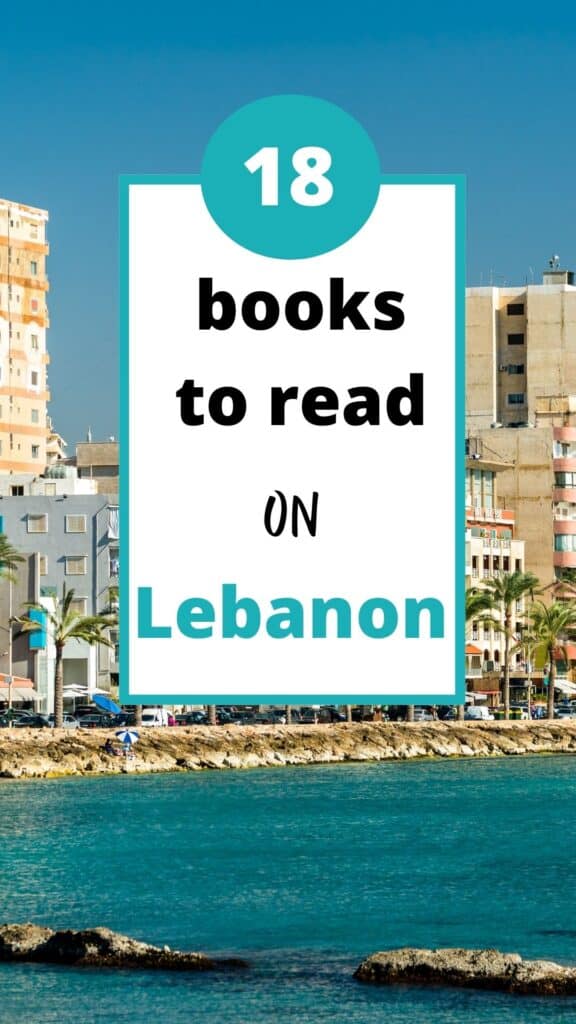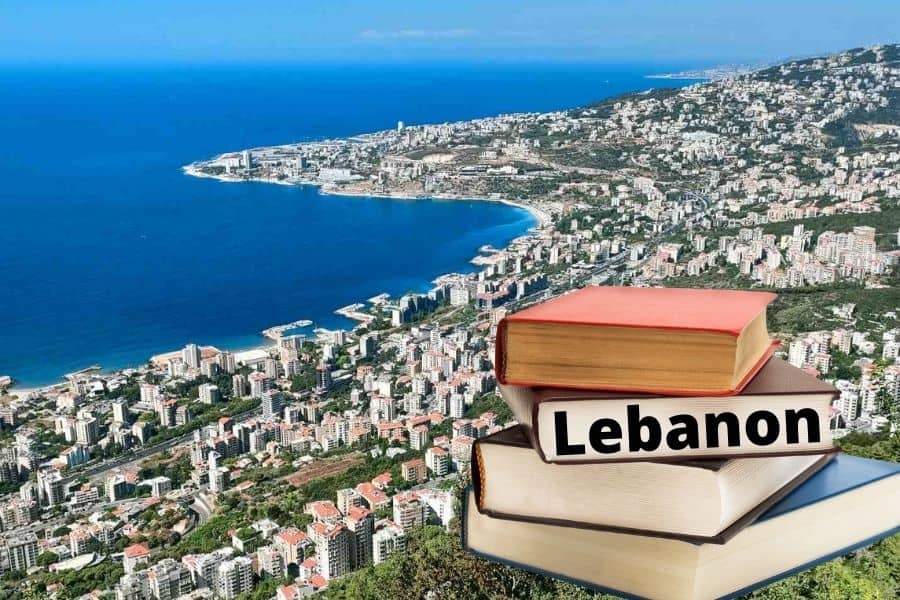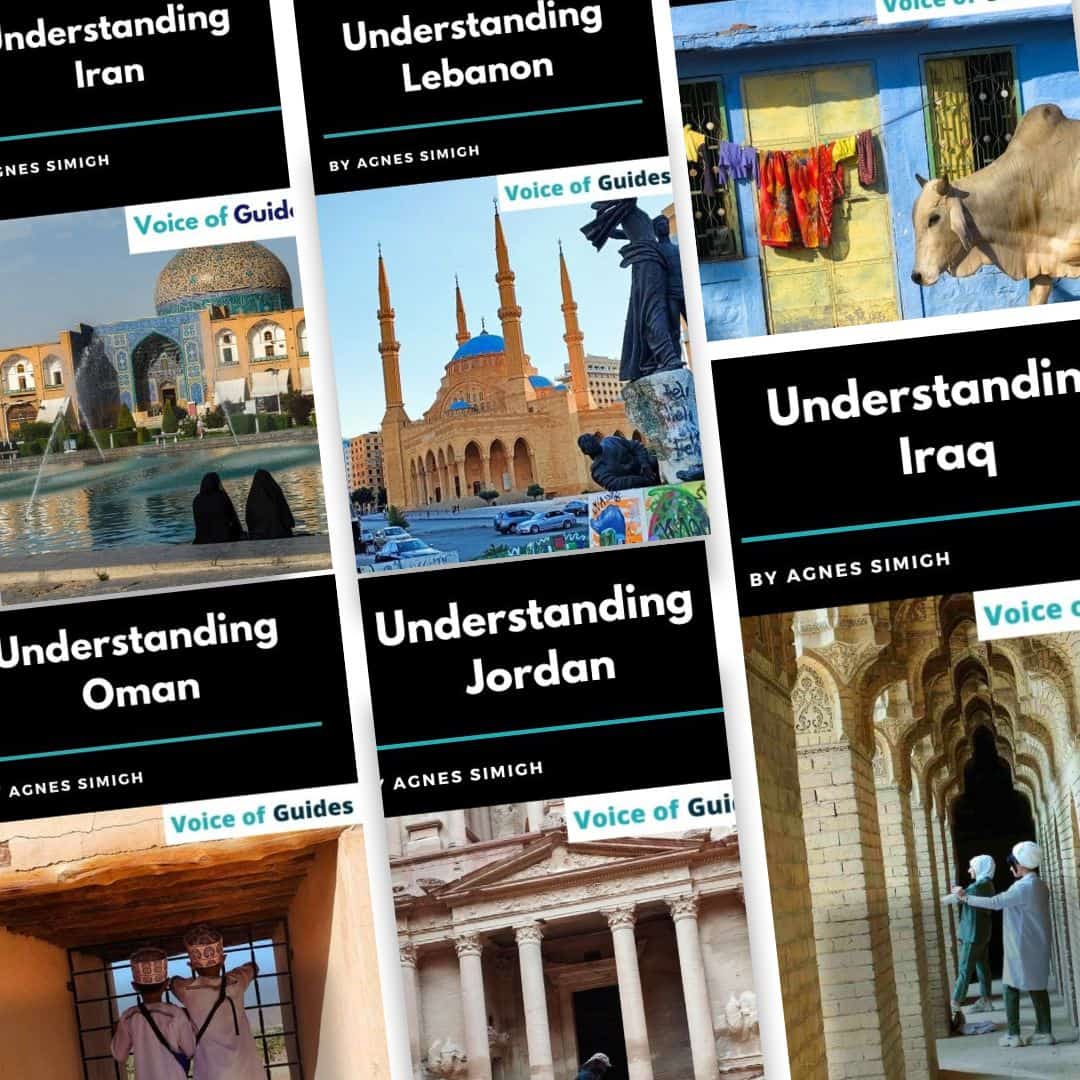This article may contain affiliate / compensated links. For full information, please see our disclaimer here.
Lebanon, the tiny Mediterranean country in the Middle East, has a complex past and present. There is no consensus about Lebanese identity, and the tension between religious communities drifted the country into a fifteen-year-long civil war. Lebanon sometimes turns up as the cosmopolitan capital of the Middle East, other times as an example of a mismanaged and corrupted nation. The following books about Lebanon help you understand the country’s various facets.
You may be interested in the best books about Iran as well.
- 1. Beirut by Samir Kassir (2010)
- 2. Pity the Nation: Lebanon at war by Robert Fisk
- 3. A World I Loved: The Story of an Arab Woman by Wadad Makdisi Cortas
- 4. A House of Many Mansions: The History of Lebanon Reconsidered by Kamal Salibi (1990)
- 5. Lebanon: A Country in Fragments by Arsan, Andrew (2020)
- 6. The Good Spy: The Life and Death of Robert Ames
- 7. Lebanon adrift: From Battleground to Playground by Samir Khalaf
- 8. Hezbollah: An outsider's inside view by Brenda Heard (2015)
- 9. Black Wave: Saudi Arabia, Iran, and the Forty-Year Rivalry that Unraveled Culture, Religion, and Collective Memory in the Middle East by Kim Ghattas (2020)
- 10. From Beirut to Jerusalem by Thomas L. Friedman (2012)
- 11. Beirut Noir by Iman Humaydan and other authors
- Travel guides about Lebanon
- The best novels about Lebanon
- Other articles about Lebanon
- Other articles about the Middle East
1. Beirut by Samir Kassir (2010)
Samir Kassir was a highly respected Lebanese-French-Palestinian journalist and history teacher. He was assassinated in 2005 like many others (including Rafiq Hariri, prime minister) because of his anti-Syrian political attitude.
This book is a tribute to Beirut, the most comprehensive account of its history from ancient to modern times. It was one of his last books before his murder.
Kassir describes Lebanon’s transformation into a cosmopolitan capital after the second world war, the architectural aspects of the expansion, and the mistakes committed in between.
Then comes the civil war, which creates a devastating landscape of the former party capital of the Middle East.
Samir Kassir’s “Beirut” is one of the best books about Lebanon.
2. Pity the Nation: Lebanon at war by Robert Fisk
Robert Fisk was a war correspondent who during the Lebanese civil war. It is a well-researched book about Lebanon’s emergence as an independent state and its drift into the Lebanese civil war. The author unfolds the country’s complex history and functioning that is otherwise hard to grasp.
“The State of Greater Lebanon” was proclaimed in 1920 with artificial borders drawn by the French colonists.
The tension between various religious groups goes back to the departure of the French in the 1940s. The French accorded the Presidency of Lebanon and the command of the Lebanese army to the Maronite Christian community despite forming only 30% of the total population. This unwritten National Pact declared that the president was always a Maronite, the prime minister a Sunni, the speaker of parliament a Shia.
Lebanon had to handle the influx of Palestinian refugees throughout the 20th century, which grew to hundreds of thousands. When the PLO (Palestinian Liberation Organization) moved its seat to Lebanon from Jordan and launched its attacks from Lebanon, the country became a potential target of Israel.
The book gives a detailed insight into the political and human aspects of the Lebanese civil war that erupted in 1975 when Maronite Christians massacred Palestinians and Beirut got divided into Muslim and Christian sections with no passage. Several international players intervened to shape the future of Lebanon. The Syrian and, later the Israeli presence led to chaos and destruction of Beirut, with death becoming part of daily life.
The author takes us through the cruelest massacres, developments, and the extremely difficult life in Beirut during the war, revealing foreign policy failures as well.
It is one of the best books about the Lebanese civil war.
3. A World I Loved: The Story of an Arab Woman by Wadad Makdisi Cortas
Wadad Makdisi Cortas is a Christian Arab woman born in 1909 in Beirut who lived some of the momentous events of the history of the Middle East. Lebanon was at that time part of the Ottoman Empire and became a French mandate in 1920.
As a woman growing up in a liberal Lebanese bourgeois family, she had the chance to study and become a teacher. She worked decades-long as the principal of the national Ahliah School for Girls, where she spent her entire working life.
The author reflects on how the historical events affected life in Lebanon. She tells about the confusion about calling her home Syria, Lebanon, or Palestine, as the boundaries of the Middle East seemed to be constantly changing in 1925.
She resented that all the compromises they had to make during the French mandate detached them from their Arab roots. The French were suspicious of everything that enhanced Lebanese self-awareness.
Pin it for later!

She describes how her life as a woman in the Arab world changed with time.
Women had limited rights in the artificially created Lebanon. They needed permission from a male relative to travel and could not own a business.
The Jewish-Palestinian clashes in the 1930s and 1940s forced countless Palestinians to leave their homes and settle in neighboring Lebanon. She taught students from all nationalities.
Through her travels to Iraq, Israel, and Jordan, we gain insight into regional political developments, and her war diary gives insight into the horror of the Lebanese civil war.
4. A House of Many Mansions: The History of Lebanon Reconsidered by Kamal Salibi (1990)
Kamal Salibi is an acknowledged Lebanese professor of history at the American University of Beirut. This book about Lebanon is not a timeline of Lebanese history but a quest for Lebanon’s common identity.
It refutes the common myths taught in schools that Lebanese people descended from the Phoenicians, about whom there is only incomplete information available. He states that Lebanese people are a mix of different ethnic groups, but according to the medieval Arabic documents, they originally come from Yemen and Oman. It is not an easy but fascinating read for those interested in the origins of people in the Levant and Arabic people.
You may be interested in the best books about Iran as well.
The topic is vital to help the country exist as a united political state rather than the coexistence of Christian and Muslim communities. Maronite Christians, Druze, Shiites, Sunnis hold different accounts of Lebanese history, which the author explains in detail. Salibi describes Lebanon as a “house of many mansions” with diverse versions of the past trying to create cohesion.
It is a reinterpretation of Lebanese history aimed to explain recent conflicts.
All the conflicting visions of Lebanon’s origins led to the eruption of the civil war in 1975. The book explains the prelude of the war but ends the historical investigation in 1975 without documenting the civil war events.
The book is available on paperback on Amazon.
5. Lebanon: A Country in Fragments by Arsan, Andrew (2020)
This book is essential to understand the post-war development of Lebanon. It breaks down the complicated political scene in the country and helps you understand the key players and interests in the game.
Prime minister Rafiq Hariri’s assassination was a turning point in Lebanese politics. People went to the street and demanded the end of Syrian influence. At the same time, two political alliances emerged, 8th March and 14th March, that split the political parties into two categories.
The author explains how the sectarian attitude defines every aspect of life. Parliamentary seats, ministerial appointments, and positions in the army and the civil service are all distributed based on confession.
Everybody in Lebanon belongs to a sect besides being Lebanese. If the bride and the groom belong to different confessions, they cannot have a civil marriage in Lebanon. They have to travel to Cyprus and undergo a complicated procedure to have their marriage accepted at home.
Palestinian and Syrian refugees now make up one-fourth of the country’s population creating heavy tensions. Despite promises, they do not enjoy equal rights with Lebanese citizens, and they are considered a burden on society. Asian domestic workers, employed in every 4th household often get exploited under the Kafala system.
The book highlights the factors that led to sharply increasing state deficit and critical economic situation.
With the brain drain, more and more men leave, and women believe plastic surgery is the way to attract men.
This is an excellent read about current problems and politics and one of the best books about Lebanon.
6. The Good Spy: The Life and Death of Robert Ames
On 18 April 1983, a bomb denoted at the US Embassy in Beirut, killing 63 people, including the legendary CIA intelligence officer, Robert Ames. This book is a biography of a spy that got close to prominent Arab leaders, including Jasser Arafat, and closely observed the ruptures of the Middle East. While the author seeks to make a detailed biography through private letters and interviews with family members and colleagues, it explains the explosion and its geopolitical aftermath as well.
It is a good read for those interested in seeing the Lebanese civil war from a spy’s point of view.
7. Lebanon adrift: From Battleground to Playground by Samir Khalaf
I learned a lot from this book about the identity and mentality of Lebanon. The title “Lebanon adrift” perfectly grasps how this open, cosmopolitan society is trying to navigate amid political uncertainties. Interim prime ministers, presidential vacancies, and political vacuum became the norm. Implausible political alliances get hastily formed to solve the government crisis that does not last, and parties often change sides.
“I have been arguing because it (the society) has not only lost its moorings and direction, but it has also lost control.” – says the author.
Lebanon built up an image in the 1950s and 1960s as the “party capital of the Middle East”, the shopping, fashion and financial center. But the deeply entrenched sectarian rivalry among Maronites, Shias, Muslims and Druze is a hotbed for corruption.
The Lebanese civil war ended without justice, provoking a certain measure of amnesia or social forgetfulness in people’s minds. Lebanese people strangely chose to party their pain away and spend excessively. For that, they became known to live for the day, enjoy life, and not care about tomorrow.
After the war, it managed to regain its role as a shopping and fashion capital.
The book touches on several aspects of the Lebanese mentality and the lack of political stability. The assassination of Prime Minister Rafiq Hariri in 2005 was one of the series of politically motivated killings, and the truth is still not known.
The book reveals the interesting socioeconomic and psychological attitude of a society that lived the highest and lowest point possible and is still trying to find its identity.
8. Hezbollah: An outsider’s inside view by Brenda Heard (2015)
The story of Hezbollah is inseparable from that of Lebanon and is one of the most controversial topics. Hassan Nasrallah is the current secretary-general, the face of Hezbollah who shows up daily through the Lebanese media addressing his followers. In the Shiite hubs, Hezbollah’s yellow flag, the images, and cardboards along the road depict Iranian clerics, including Ayatollah Khomeini, Ali Khamenei, or Hassan Nasrallah.
The book summarizes the emergence of Hezbollah as an Islamic resistance armed force after the Israeli invasion of Lebanon in 1982. The twenty-two-year military occupation ended in 2000. Hezbollah openly declared that its principal mission is to protect Lebanon from the Israeli threat of attack. Iran and Syria supports the mission.
Today, Hezbollah is more than a military force. It has political representatives in the Parliament and finances social care services for primarily Shiite people.
The United States of America, the United Kingdom, Germany, the Arab League, and Israel consider Hezbollah as a terrorist organization in its entirety. In contrast, the EU listed only its military wing as such. Hezbollah has a significant grasp on Lebanon’s life.
The July War in 2006 was another milestone in Hezbollah’s history that they declared a victory against Israel, although it made one-fourth of the population flee their homes.
Lebanese people’s attitude to Hezbollah was changing. It has supporters among every religious community (Christians, Sunnis, Shias, Druze), but the current economic crisis severely damaged its reputation.
It is an informative book about Hezbollah’s history, mission, and role in Lebanese society.
9. Black Wave: Saudi Arabia, Iran, and the Forty-Year Rivalry that Unraveled Culture, Religion, and Collective Memory in the Middle East by Kim Ghattas (2020)
The recently published book of the Dutch-Lebanese BBC reporter is an excellent, easily understandable book about Lebanon and the entire Middle East.
The author makes the heavy topic easily digestible by anecdotes, human stories, and sharing cultural aspects. The Israeli-Palestinian conflict was, of course, an important event that shaped the region’s political scene.
But she emphasizes that 1979 was a crucial year in the Middle East that affected the later events and relations. The Islamic revolution dethroned the Shah in Iran, extremists seized the Holy Mosque in Mecca demanding the removal of the Al Saud dynasty, and the Soviet occupation also started this year.
The author covers the Lebanese civil war, the war between Iraq and Iran, the emergence of Al Qaida, the global fight against terrorism after 9/11, the spiraling effects of the Arab Spring, and the latest events.
If you want to have a clear view of the region, it is a highly recommended book to read.
10. From Beirut to Jerusalem by Thomas L. Friedman (2012)
This book is an excellent overview of the politics that shaped the Middle East. The appearance of the PLO (Palestine Liberation Organization) in 1964 in Lebanon under the leadership of Yasser Arafat brought the confessional discrepancies of the Lebanese society to the surface and drifted the country into civil war.
The author recounts the civil war and explains who the key players were and how the political sides changed during the conflict.
The war started as a Muslim-Christian conflict, then evolved into Christians fighting against Christians and Muslims fighting against Muslims. At the latest stage, nobody exactly knew who the enemy was.
The author analyzes the Lebanese psyche, people’s mental struggle, and how being immune to death became the norm.
The second part of the book describes the background of the Israeli-Palestinian conflict, with attempts to make peace and the Palestinians’ life under Israeli occupation. An Israeli ID is a key to survival. Those in Gaza and the West Bank learn Hebrew, apply for the ID to get work, but never recognize the Israeli state. They consented to the non-violent occupation of Israel.
Israel itself is full of contradictions, where the ultraorthodox Jews only accept their way of life as genuine, while most Jews are non-observant. The holocaust is part of the curriculum, and jews learn to be victimized, which turns them against the Palestinian since they are born.
The book is an excellent overview of some important events and aspects that have shaped the Middle East and helps understand the complex regional politics.
11. Beirut Noir by Iman Humaydan and other authors
Beirut Noir is a series of stories from locals who lived during the civil war, and by recalling their memories, we gain insight into the psyche of the war.
It is a collection of 15 short stories, each set in a different district of Beirut (Bourj Hammoud, Raouche, etc.) They have little in common, except that they all reflect personal experiences during the war. The book perfectly grasps the various faces of Beirut, the conservative, the glamorous, the struggling, or the hopeful. Some stories are humorous, while others are deplorable. The unrelated stories reflect the controversial and complex attitude people developed during the war.
“The Bird Nation” is a shocking metaphor that best describes the cruelty of the war and how the decision-makers send the people to death. People grow wings to escape, and as they fly around, the politicians point at them with their rifles from the ground.
Travel guides about Lebanon
1. Beirut by Jessica Lee – 2014
It is probably the best travel guide to Beirut. The author gives practical advice for travelers about where to sleep, eat, and the places to visit and shares essential information to understand Beirut’s complex past and present.
The best things to do in Lebanon in 7 or 10 days
How to spend 2-3 days in Beirut
Apart from Beirut, you get tips on the best day trips outside Beirut. Because of its compact size, everything is reachable within a day.
Beirut has such a central role in Lebanon that the country is best described as Beirut and the rest. There is so much to see in the city, but you will only appreciate it when you understand it.
I find this book the best to discover Beirut.
2. Lovely Lebanon: A Little Country with a Big History by Mary Jane Walker (2019)
It is a very well-written travel book, a perfect introduction to Lebanon that explains history, politics, and religion and gives an overview of Lebanon’s best places to visit. We learn exciting details about the country.
3. Bradt travel guide Lebanon by Paul Doyle
The Bradt travel guide is a perfect choice to get a good understanding of the country’s history, culture and tourist attractions. This book helps you discover the famous and less-known gems of Lebanon. Published in 2017, this is also the most-up-to-date guide available and will be of great help during your trip.
The best novels about Lebanon
1. Beirut Hellfire Society by Rawi Hage (2020)
The book takes the reader into the darkest period of Lebanon, the 15-year-long civil war. Pavlov, a son of an undertaker, takes over his father’s job in the war-torn Beirut. His father was a member of a secretive Hellfire Society, which broke with the Muslim principles to bury the dead, and offered to cremate them. These are often people whom the state, the clergy, or their family denied burial because of their sexuality or religion.
Pavlov would cremate his own father as well.
People in Beirut have to deal with death daily and makes everybody crazy at a certain level. Pavlov’s life revolves around death even at night since he lives in a flat above the cemetery. Nobody knows who is next. Everybody had a different fate. Some were murdered, some had an accident.
The book reveals personal stories of the victims and thus reflects on the horror of the civil war.
2. The Stone of Laughter by Hoda Barakat (1998)
It is the first book by an Arab author with a homosexual protagonist, Khalil, trying to find his identity during the civil war. He loses two friends he is attracted to, Naji and Youssef, but there is not much time for grief when Israeli bombings shatter Beirut, and everybody worries for his safety.
The books also got critics for being anti-feminist. While trying to figure out whether his feelings reflect a strong friendship or more than that, he analyzes woman’s behavior and gender roles. Khalil states that women have easier lives without thinking about which military force to join and dealing with war and politics.
Through the eyes of Khalil, we learn how people try to preserve some normality amid bomb raids, even if their actions seem senseless to the outsider.
3. An Unnecessary Woman by Rabih Alameddine (2014)
This novel is about a 72-year-old woman, who faces her late-life crisis living through the Lebanese civil war.
Aaliya got divorced after four years of marriage when she was still only 20. Since then, she has lived a lonely life, alienated from her half-siblings and mother, who anyway treated her as a disdained appendix to the family.
She stays alone in a spacious apartment in Lebanon, shut-in during the civil war, and contemplates her life and literature. Out of her miserable life, she finds refuge in books and literature.
Aaliya works as a translator, and her latest mammoth project of 900-page raises several questions about her age and turbulent life.
Although the story is not eventful, more self-reflection of an aging woman, critics gave positive feedback on how it still captivates attention.
4. Confessions by Rabee Jaber (2005)
The novel set in Beirut during the Lebanese civil war is about a young boy, Maroun, who discovers his identity only as a university student.
The man he believed to be his father turned into a cold-blooded murderer after he lost his son in the war. He assassinated the entire family of Maroun at the demarcation line that separated the Christian East and Muslim West Beirut in 1976, except the small boy who was at the same age as his son would have been if he was still alive. He calls the child after his deceased son, Maroun.
The boy’s whole life was a misconception. He was raised to nurture hatred towards the people living on the other side of the Green Line and finally understands that he belongs to those he was supposed to disdain.
I hope you find the above list of the best books on Lebanon and the Middle East useful!
Other articles about Lebanon
Travel itinerary for Lebanon in 10 days





















